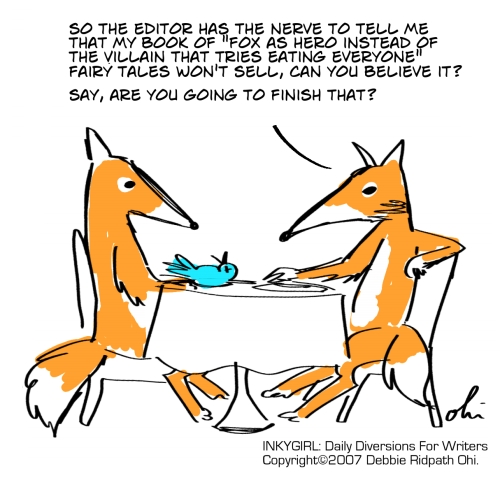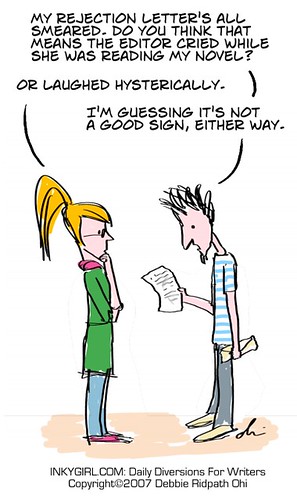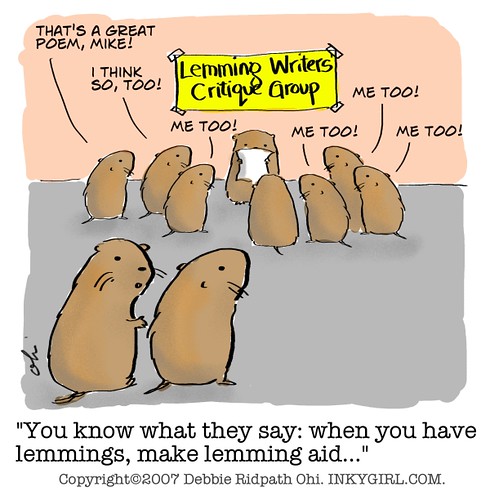I have mixed feelings about the word "luck" when it comes to publishing success because sometimes it's used in a context that doesn't give the writer enough credit for his or her own efforts or work.
At an SCBWI conference earlier this year, I overheard someone commenting to a friend of mine about how lucky she was in her publishing success. No reference to how hard she had worked or how much they enjoyed the book, etc. Just how very LUCKY my friend was.
Hm.
I've also been on the receiving end of the "you're SO lucky" comment several times as well, so can sympathize. In case you're not familiar with my publication story, here's what happened in 2010.
Yet part of me can understand the other person's point of view as well, having had experienced many (many) years of collecting rejection letters myself, in both print and digital format. I still so strongly remember how frustrating and depressing it could get, working hard to improving my craft and seeing increasingly encouraging comments from editors, yet never getting a book contract offer.
"Just write," common writing advice told me. "Don't give up!" Easy for YOU to say, I remember thinking. You're already published.
Here's what I've learned:
Luck does play a factor, but you can help make your own luck.
My friend Maureen McGowan (author of The Dust Chronicles) compares this kind of luck to building lightning rods. You can't control when the lightning will strike but you CAN build better lightning rods.
So my advice is to stop angsting about what you can't control and do what you can to make your own luck. Build better lightning rods.
 |
| Don't go overboard while building that lightning rod! |
Some suggestions on how to build a better lightning rod:
1. Meet others in the industry. I can't emphasize this enough. Networking online is great, but nothing can replace face-to-face interaction. If I could send a message back to myself before lightning struck, I would have told myself, "Start attending SCBWI conferences." I mention the SCBWI because that's how everything got started in my case. There are many other excellent conferences and events that might better suit your budget, geography and goals. In Canada, check out Packaging Your Imagination in Toronto; registration for this year's conference has just opened.
Registration will also soon be open for the SCBWI Canada East convention in Montreal (Oct.4-6, 2013); I'm going to be on the faculty along with Bonnie Bader (Penguin), Jill Santopolo (Philomel), Linda Pratt (Wernick and Pratt Agency), Laurent Linn (my art director at Simon & Schuster Books For Young Readers!!) and David Diaz (Caldecott-winning illustrator and SCBWI Illustration Mentor rock star :-)).

2. And when I say "others in the industry," I don't just mean agents and editors. Meet other writers, both published and unpublished. You can learn from all of them. What helped me: commiserating with others who were in the same situation, for mutual encouragement as well as helping to put things in context. This improved my overall attitude, which I'm sure showed in my public posts. I also became better acquainted with some of these contacts over the years we have helped each other from time to time, including sharing of info and helping promote new books.

3. Establish an engaging, active presence online. Learn how to improve your website and/or blog. Learn how to use social media. I have heard many agents and editors say that before they sign a client or offer a contract, they do research online to see what kind of online presence the author may have, what kind of person they are, etc.

BUT REMEMBER:
All the above advice assumes that you already have a good mss with market potential. If your writing sucks or your story idea is lame/overdone, having the biggest and most technologically advanced lightning rod won't help. So...
4. Keep working on improving your craft. Write every day. Work on getting better. Find a good critique group like MiGWriters.
Do you agree or disagree? Any other advice to suggest for writers? Please do post it below.
-------------------
Debbie Ridpath Ohi writes and illustrates for young people. For a list of her current and upcoming books with Simon & Schuster, HarperCollins and Random House, see her Books list. She blogs about kidlit/YA at Inkygirl.com and tweets from @inkyelbows.


Really well put Debbie - and great illustrations!
ReplyDeleteI love this: "You can't control when the lightning will strike but you CAN build better lightning rods." Perfect approach to this industry, and great advice through the post, too. Thanks!
ReplyDeleteGreat post, Debbie. Thank you. I am working on my lightning rod.
ReplyDeleteYay, this post makes me happy- I actually HAVE lightning rods in my ms, lol! =)
ReplyDeleteExcellent post! I've been on the fence about joining my local SCBWI chapter since I've been primarily a writer for adult markets but I'm dipping my toe into MG. It's time to go big or go home. ;)
ReplyDeleteHoly smokes I needed this today. Thank you. I believe in making your own luck, even if it means blood, sweat and tears.
ReplyDeleteJaye: Thanks!
ReplyDeleteSuzanne: Glad you found my post useful. I'm grateful to Maureen McGowan for coming up with the lightning rod analogy. Fits so perfectly!
Alison: Fingers crossed!
Leandra: Ha! :-D
Stacey: Yes!! I strongly recommend joining SCBWI.
bfav: Wishing you luck in your writing.
Well said, Debbie. Don't know where I'd be without my SCBWI peeps and my online writing community. Some of whom commented above. Now if I could just figure out how to get everyone on the planet to read my debut MG novel. . . ^_^
ReplyDelete